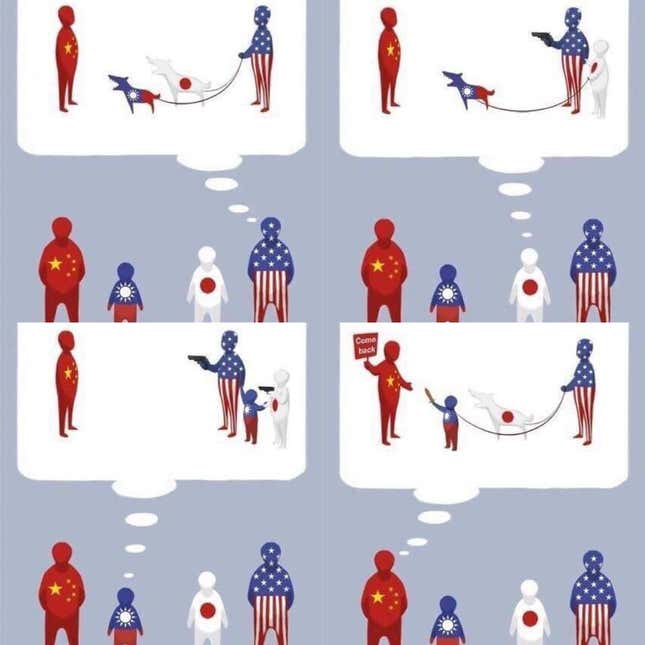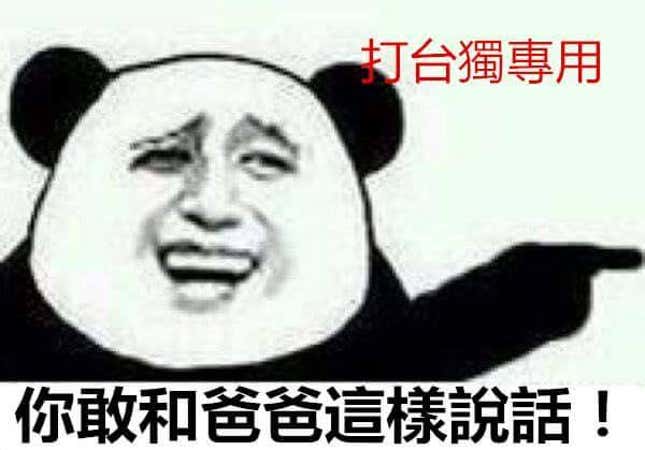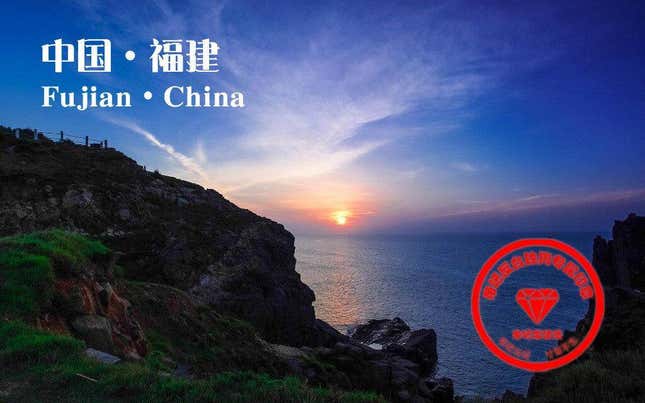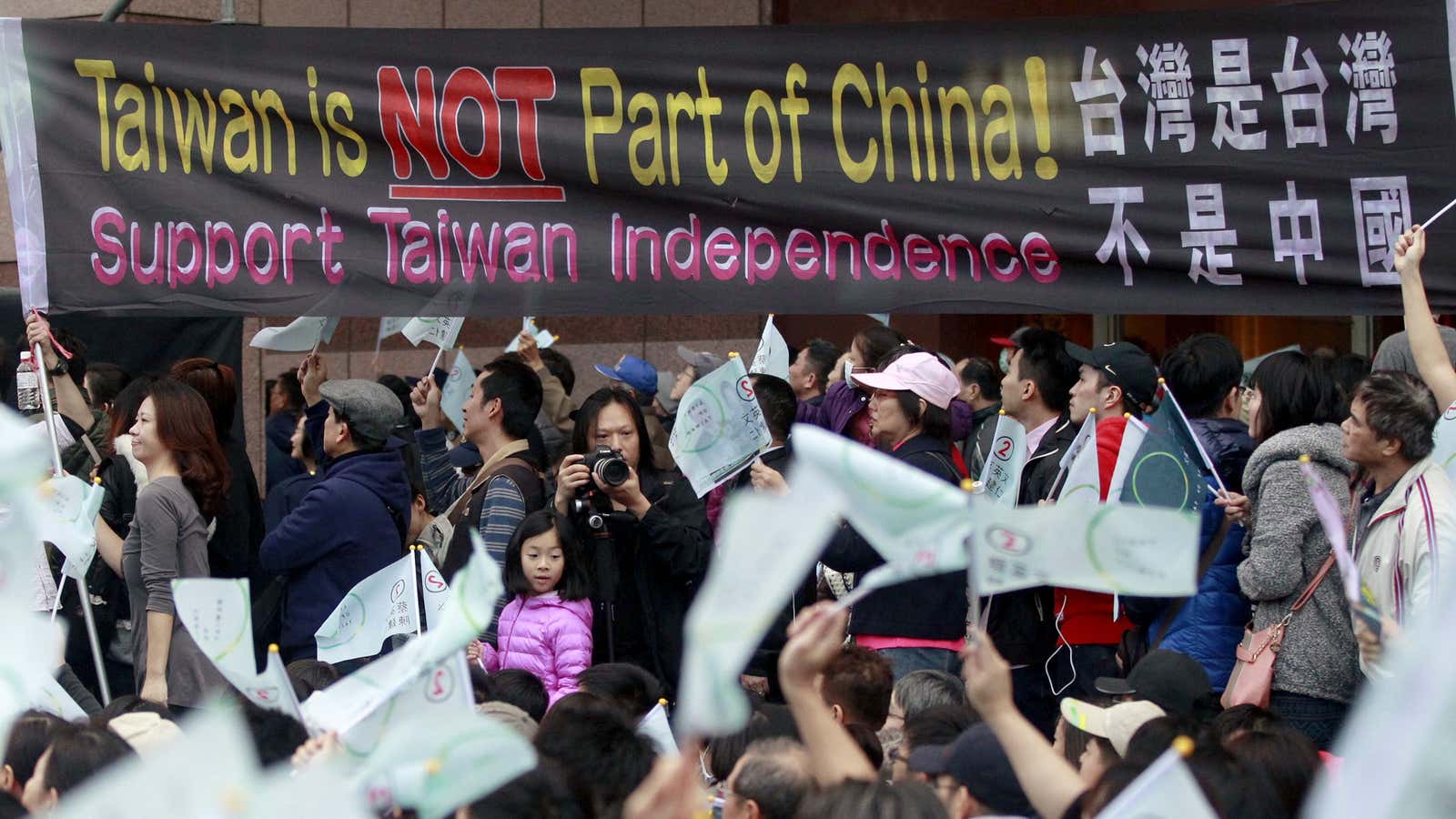The trolls planned their attack for 7pm, China time, on January 20. Members of Di Ba—one of the largest message boards on the internet—would organize into groups, leap over the Great Firewall to reach Facebook, and flood it with the message that Taiwan is part of China.
Their war chant: “Di Ba goes to battle. Nothing will grow.”
After 7, anti-independence and pro-China posts started to take over the Facebook page of Tsai Ing-wen, Taiwan’s newly elected president, and of independence-minded media like Apple Daily and Sanlih News.
Tsai’s latest Facebook post, about a meeting she had with leaders from her Democratic Progressive Party (DPP), attracted nearly 40,000 Facebook comments in just eight hours.
Taiwan is a self-governing democracy that China considers part of its territory. The official Chinese position is that any formal declaration of independence would automatically trigger a military invasion. The DPP has long been associated with a pro-independence stance, though under Tsai it has taken a more moderate approach, preferring to maintain the status quo with China.
News of the attack spread far and wide, with a number of posts making their way around social network WeChat. For most of the day “Di Ba’s Facebook battle” has been at the top of the list of searched terms on Weibo, a Chinese microblog site similar to Twitter. News outlets in Taiwan covered the story (link in Chinese).
Information also spread suggesting that Di Ba’s battle was organized and well-prepared. Screenshots showed that attackers were separated into six “columns,” in the military sense: information gathering; posting; writing opinions and creating images; translation; miscellaneous Facebook tasks such as liking posts; and a vanguard to head things up.
Di Ba’s leaders encouraged posters to be “civilized,” attacking the idea of Taiwanese independence, rather than individuals or the Taiwanese people.
Some posts were indeed somewhat civilized, with several posts expressing a kind of sadness over Taiwan’s rejection of China and unwillingness to unify:

Of course, despite instructions, not all Di Ba warriors remained civilized.
Di Ba is a forum on Tieba, a massive online community with millions of discussion groups on everything from food to foreign affairs. Di Ba is the largest group of all, with a staggering 20.6 million users. (The population of Taiwan, meanwhile, is about 23 million.) The source of both beloved internet memes and large-scale nationalist trolling, it’s like 4chan, but for Chinese patriots.
The group got anti-Taiwan independence messages across in virtually every way imaginable, posting the cartoon above, declarations that Taiwan “belongs to China,” long excerpts from Chinese Communist Party propaganda, “reaction images” with text on them, photos of Chinese food not native to Taiwan, and even ironic posts that seemed to poke fun at the whole “battle.”

Many of those posting picked up on the theme of Taiwan’s poor sense of filial piety to its “father,” China, often depicted as a panda with the face of a man. These images have text like “Don’t talk back to your father” and “That’s how you speak to your father!”
Another theme was Taiwan’s population, and how small it is compared to that of China. “I have more reaction images than you have people,” one image read.
There are a bunch of other memes at play in the Di Ba battle, too, like the phrase ”for X use only,” such as “for father’s use only,” or “for attacking Taiwanese independence only.” And there is a familiar argument, presented by some users, that Taiwan is culturally no different from China. Here is one post (in Chinese):
Those who support Taiwanese independence, stop acting so superior. What things do you have that are your own? Isn’t your so-called Taiwanese [language] from Fujian province? Didn’t your food culture come from Chinese culture? What reason do you have to be superior?
Of course, Taiwanese culture existed both before and after Chiang Kai-shek fled China to establish a government-in-exile in Taipei. And shared culture doesn’t seem to matter to Taiwan, where fewer people than ever identify as Chinese.
There were also several odder Facebook posts about Taiwanese independence. One user appeared to primarily be posting images of picturesque places in mainland China, perhaps to remind people in Taiwan of its beauty. On each image was a Di Ba watermark reading, “Special Di Ba anti-Taiwan independence seal.”

It’s unclear how serious all of this is. An image of Tsai Ing-wen laughing and exclaiming, “Finally, I’m governor of Taiwan province,” could be very offensive or perhaps darkly funny, depending on the context.
Taiwanese Facebook users reciprocated with images of Taiwan’s flag, the Tiananmen Square massacre, and of Chinese president Xi Jinping looking foolish. There were also frequent invocations of the stereotype that mainland Chinese people are dirty and uncouth. Basically, it ended up like any internet flamewar, but Di Ba indisputably brought superior numbers to the fight.
On the whole, the Di Ba attack is a bit ironic, as Taiwanese independence is a taboo on the Chinese internet. Mentions of it are sometimes censored (link in Chinese), which may be why Di Ba and others online refer to independence as “TD,” an acronym for taidu, or “Taiwanese independence” in Mandarin.
To voice their real anti-independence feelings, China’s netizens had to flee to Taiwan’s internet.
Siyi Chen contributed reporting.
